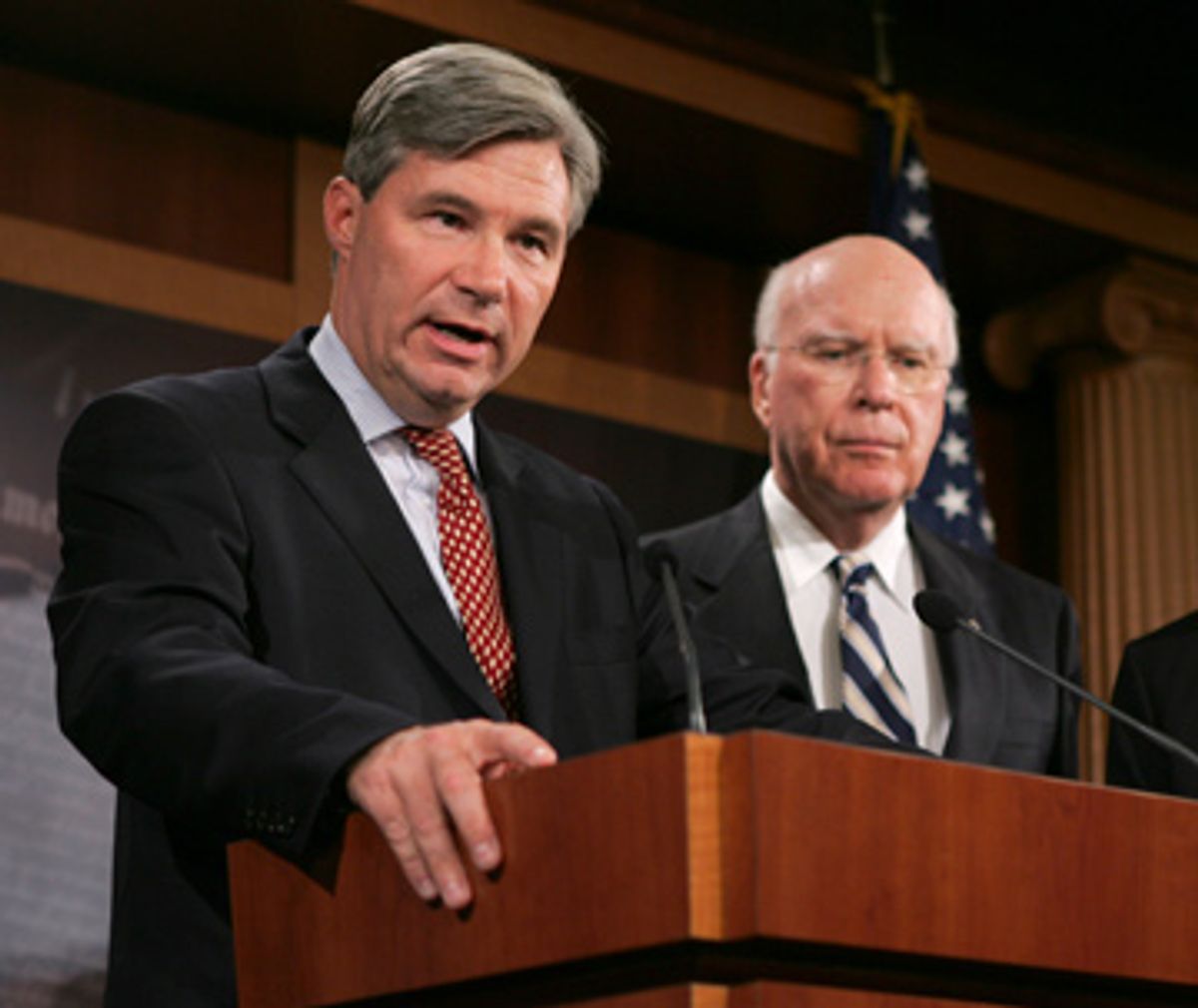The Senate Judiciary Committee plans to move forward with a commission to investigate torture during the Bush administration. Committee Chairman Pat Leahy, D-Vt., told Salon Tuesday that his panel would soon announce a hearing to study various commission plans. His staff said the announcement could come as early as Wednesday.
While Michigan Democrat Rep. John Conyers drafted a bill to create a commission to review abuse of war powers during the Bush administration, co-sponsored by North Carolina Republican Rep. Walter Jones, Leahy's Senate commission would represent the first concrete steps toward a broad review of U.S. torture since 9-11.
Spearheading Senate efforts to establish a torture commission is Rhode Island Democrat Sheldon Whitehouse. As a member of both the Judiciary Committee and the Intelligence Committee, Whitehouse is privy to information about interrogations he can't yet share. Still, regarding a potential torture commission, he told Salon, "I am convinced it is going to happen." In fact, his fervor on the issue was palpable. When asked if there is a lot the public still does not know about these issues during the Bush administration, his eyes grew large and he nodded slowly. "Stay on this," he said. "This is going to be big."
Whitehouse admitted he had not discussed the plan yet with President Obama, who has been notably wishy-washy on the notion since taking office. On the one hand, Obama has consistently said that "my administration is going to operate in a way that leaves no doubt that we do not torture." Yet on the other hand, he has insisted that "nobody is above the law, and if there are clear instances of wrongdoing, that people should be prosecuted just like any ordinary citizen; but that generally speaking, I'm more interested in looking forward than I am in looking backwards."
According to Whitehouse, current politics dictate that Congress should take the lead on establishing a torture commission. "When you look at the economic meltdown that [Obama] was left by the Bush administration, you can see why he would want to reassure the American public that he is out there looking at these problems and trying to solve them and not focusing on the sins of the past," he said.
Whitehouse, however, predicted that Obama would not object to a torture commission moving forward in Congress. Besides, he said, "When push comes to shove, we are the legislative branch of government. We have oversight responsibilities. And we don't need the executive branch's approval to look into these things just as a constitutional matter."
Plans to establish the commission still remain in their infancy, as senators and staff look at previous panels, such as the 9-11 Commission, and investigations following Watergate. Whitehouse, a former U.S. attorney, noted that a torture commission might need the power to immunize witnesses on a case-by-case basis. The prospect of future prosecutions, he said, are beside the point. Most important was putting a spotlight on abuses committed by the Bush administration.
"We have this American government, which has an architecture and a shape and a system that drives it and constrains it and that keeps it honest," he said. "And what happened is that the Bush administration figured out a lot of ways to tunnel through the walls and sneak over the fences. So now we need to go back and say, 'We have got to plant those walls deeper so you can not tunnel under them.' We've got to spotlight how they did it," Whitehouse explained. "The ultimate goal in this is to protect and enhance American democracy."
Last week, retired Maj. Gen. Tony Taguba, known for conducting an honest investigation of prisoner abuse at Abu Ghraib, discussed his support for such a commission in an exclusive interview with Salon. Taguba joined a group of former high-level diplomats and law enforcement officials who also announced their support for a torture commission late last week, along with 18 rights groups.
During that interview, Taguba stated that any review must include close analysis of claims from Bush administration officials that abusive interrogations worked. "Some of those activities were actually not effective and those who thought so were in the academic or pristine settings of their offices," Taguba said. "What would they know?"
Whitehouse agreed, and depicted as ironic the fact that some members of the intelligence community saw themselves as "the Lance Armstrongs of interrogation," while some members of the military objected to abuse as ineffective. "In fact, the exact opposite was true," Whitehouse said about such claims from the CIA."It was amateur hour with them, and the career, tough, serious military interrogators said that this just was not effective," he said. "But it is important to prove the point, because they keep saying, 'We saved lives. We interrupted plans. We did this, that and the other.'" Whitehouse added, "Well, when you drill down, there is never a fact there. It turns into fog and evasion."



Shares